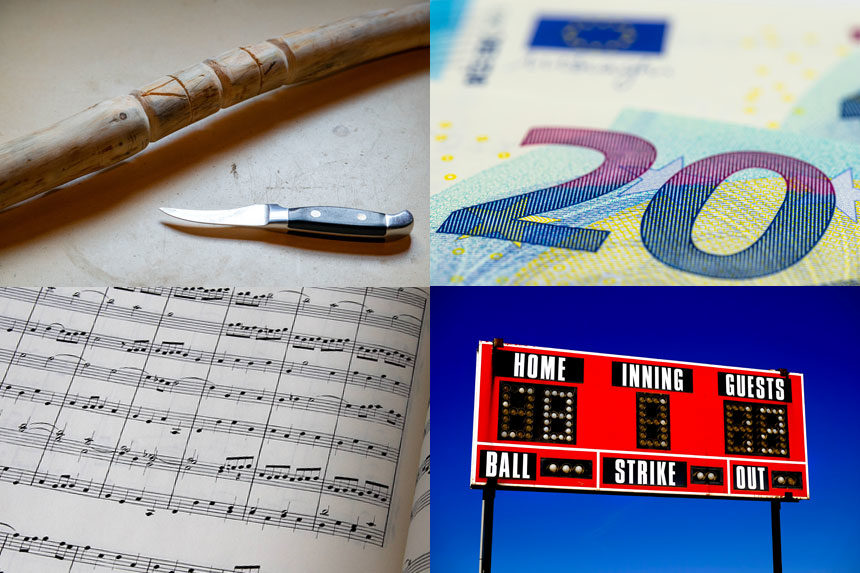Managing editor and logophile Andy Hollandbeck reveals the sometimes surprising roots of common English words and phrases. Remember: Etymology tells us where a word comes from, but not what it means today.
To score means to mark something with lines, scratches, or notches, but it also means to get a point in a game. Score can also mean, as it did in Lincoln’s Gettysburg Address, twenty, as well as the piece of printed music that a conductor uses to guide a musical group through a piece. That’s four separate scores in four separate spheres, but what’s remarkable is that they all ultimately derive from the same etymological source.
What follows is, in brief, the story of how score got from Old Norse to modern opera.
Score: To mark with lines or notches
Score began as the Old Norse skor “incision, notch,” which, at the end of the 14th century, became the Old English scoru “to mark with incisions or notches.” (The word shear is also related.) Even while the word continued to develop in other directions over the centuries, this early meaning persisted to this day.
Score: Twenty
That explains what scoring was, but understanding what and why people were scoring leads us to the word’s second meaning. It’s believed people would use marks or notches when counting large numbers of things, with each score indicating 20 items. For example, a shepherd might use notches on his staff to keep track of a large herd of sheep. With each score indicating 20, it wasn’t long before the word score simply filled in for the number 20.
With today’s most common counting systems centering on 10s and 12s, a system based on 20s might sound odd, if not far-fetched, but it was fairly common on the old days — especially on the island where English would first flourish. The ancient Celts’ counting system was vigesimal — which means “based on the number 20” — and vigesimalism has been a feature of Welsh, Gaelic, and Irish systems, all likely influenced by the Celts.
You can even find remnants of vigesimalism in Europe today: Modern French doesn’t have separate words for 80 and 90. They’re called quatre-vingt and quatre-vingt-dix, literally “four twenty” and “four twenty ten.”
Score: A tally of points won in a game
What began as marks to count things became the counting itself. In 15th-century England, tavern owners would track of a customer’s drinks by simply making a mark (that is, a score) on a board or slate so, when it came time to pay (to “settle the score,” as it were), they wouldn’t have to rely on memory to charge the right amount.
It’s this sense of score — one mark indicating one drink rather than twenty — that was extended by the mid-17th century into another thing people liked to do in taverns: play cards. Though the usage began earlier, Edmund “according to Hoyle” Hoyle popularized keeping score and scoring in games during the 18th century through his books.
Score: The printed notation of a musical composition
The route that led score to name the printed music that, say, an orchestra conductor works from is a bit murkier. The usage shows up in print at the beginning of the 18th century, and it is believed that the “scores” here were the vertical bar lines that ran through multiple music staves to mark them as a related. Those related lines of music so marked became the score rather than the measure lines themselves.
We’re Still Scoring
English speakers continue to find new ways to use score. Especially once the word found a place in sports, it began to proliferate through our widespread use of sports metaphors. Those who know the score (i.e., the harsh truth) understand that a friend who says they scored over the weekend needs to be further questioned: They could have found a willing sexual partner, they might have discovered a good deal on bulk toilet paper, or maybe they whittled notches into a walking stick for a couple days.
Featured image: Shutterstock
Become a Saturday Evening Post member and enjoy unlimited access. Subscribe now



